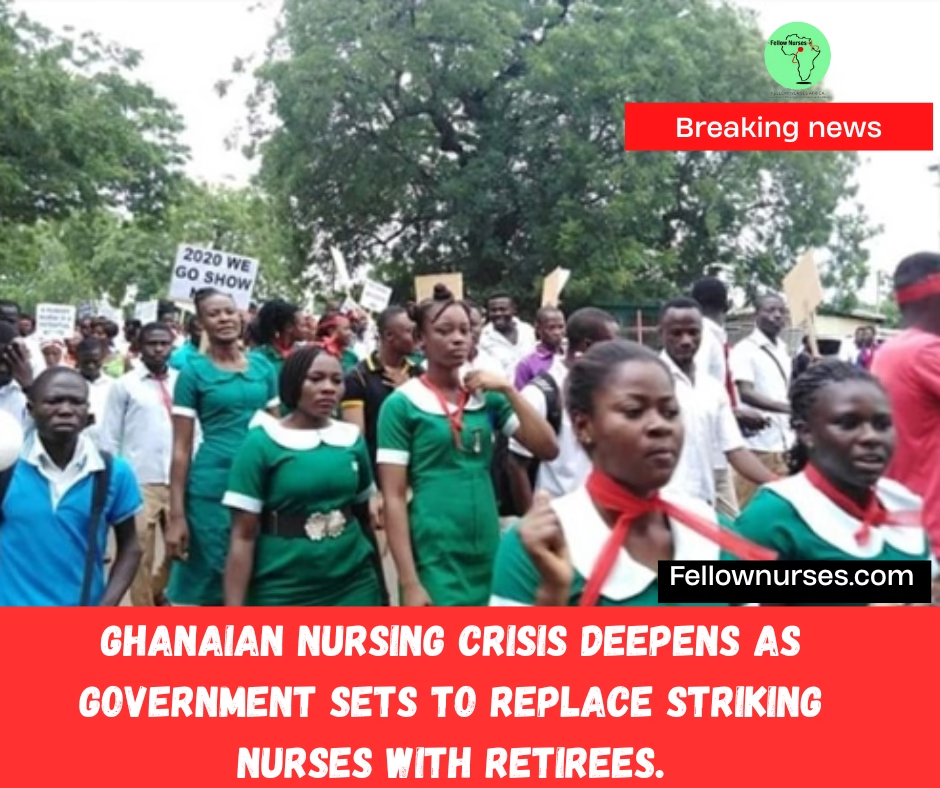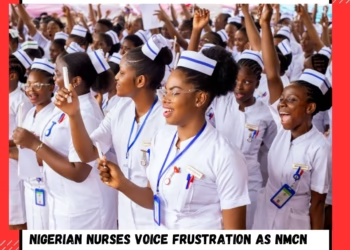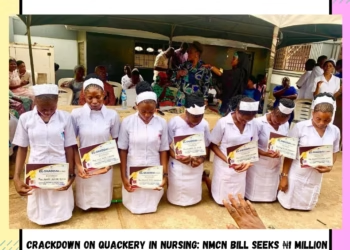Fellow Nurses Africa News || Accra, Ghana|| June 10, 2025
Ghana’s Nursing Crisis Deepens as Government Plans to Replace Striking Nurses with Retirees
Ghana’s healthcare system is teetering on the edge of collapse as the nationwide strike by the Ghana Registered Nurses and Midwives Association (GRNMA) enters its second week, leaving hospitals overwhelmed and patients stranded. In a controversial move, the government has announced plans to replace striking nurses with retired nurses and midwives, who are being urged to volunteer their services temporarily. This decision has sparked outrage among striking nurses and raised concerns about the sustainability of healthcare delivery, as the deadlock over the 2024 Collective Agreement persists.
The GRNMA Strike: A Crippling Blow to Healthcare
The GRNMA, representing over 128,000 nurses and midwives, launched an indefinite strike on June 2, 2025, escalating to a complete withdrawal of services on June 9. The industrial action stems from the government’s failure to implement the 2024 Collective Agreement, which promised improved salaries, allowances, risk benefits, and rural posting incentives. Signed in May 2024 under the previous administration, the agreement remains stalled due to budgetary constraints, with the government proposing a deferred implementation until 2026—a timeline the GRNMA has rejected as unacceptable.

The strike has paralyzed healthcare facilities nationwide. In the Ashanti Region, major hospitals like Suntreso Government Hospital and Komfo Anokye Teaching Hospital are struggling, with doctors forced to take on nursing duties amid severe staff shortages. At Adabraka Polyclinic in Accra, patient wards are eerily empty, and many are turning to costly private hospitals. The Mortuary Workers Association of Ghana reported a grim rise in deaths, with mortuaries recording 20–25 bodies daily compared to the usual 10, attributing the spike to the absence of critical nursing care.
Government’s Response: Retirees as a Stop-Gap
Facing mounting pressure, Health Minister Kwabena Mintah Akandoh announced on June 10, 2025, at a press briefing in Jubilee House that the government is calling on “public-spirited” retired nurses and midwives to volunteer their services to alleviate the strain on hospitals. “We are appealing to retired health professionals to step in temporarily while we work to resolve this impasse,” Akandoh stated, emphasizing the need to prioritize patient welfare. The government also plans to publish a list of operational healthcare facilities to guide patients.
However, the plan to replace striking nurses with retirees has met fierce criticism. The GRNMA condemned the move as a “diversionary tactic,” with General Secretary David Tenkorang Twum asserting, “Deploying retirees does not address our demands for the immediate implementation of the Collective Agreement.”
However, critics have called the strategy an “absolute stupidity,” questioning the feasibility of relying on retirees, many of whom may face health or mobility challenges.
The government has also faced accusations of using unlicensed students and rotation nurses to fill gaps in emergency and outpatient departments, a practice the GRNMA deems “unethical and unsafe.” The association warned of a complete shutdown of services if such actions continue, citing violations of Ghana’s Labour Act and risks to patient safety.
GRNMA’s Resolve and Splintered Unity
The GRNMA remains steadfast, rejecting the government’s 2026 implementation timeline and demanding that the agreement be enforced by June 2025, with arrears paid from September 2025. The National Labour Commission (NLC) declared the strike illegal on June 5, securing an interlocutory injunction, but the GRNMA claims it has not been officially notified and continues its action.
Tensions within the nursing community have surfaced, with the National Association of Registered Midwives Ghana (NARM-GH) distancing itself from the strike. NARM-GH President Leticia Asaba Atiah criticized the GRNMA for excluding them from negotiations and removing them from communication platforms without consultation, calling the strike “undemocratic.” Meanwhile, the Union of Professional Nurses and Midwives, Ghana (UPNMG) at Tamale Teaching Hospital has continued to provide services, further highlighting divisions among healthcare workers.
Economic and Social Fallout
The government argues that implementing the Collective Agreement immediately would add GH¢2 billion to the 2025 budget, a cost Deputy Finance Minister Thomas Nyarko Ampem described as economically disruptive. Health Minister Akandoh cautioned that rushed implementation could destabilize the economy, urging dialogue to find a balanced solution.
Public sentiment is increasingly desperate. Patients like Abdul Rahim Sulemana at Tamale Teaching Hospital expressed frustration, noting the strike’s severe impact on care access.
Historical Context and Long-Term Implications
Ghana’s nursing crisis is compounded by a history of workforce challenges. A 2019 study highlighted a demographic shift in the nursing workforce, with 71–93% of nurses and midwives aged 35 or younger by 2018, raising concerns about inadequate mentorship and burnout risks. The study proposed a national mentorship program and re-engaging fit-to-practice retirees to support younger nurses, a suggestion now ironically echoed in the government’s crisis response. Since 2020, over 3,688 nurses have left Ghana for better opportunities abroad, exacerbating shortages and leaving inexperienced staff to fill critical roles.
The current crisis risks further accelerating nurse migration, with the Ghanaian-Diaspora Nursing Alliance (G-DNA) noting that 3,000 nurses left in early 2022 alone. Without addressing underlying issues like poor working conditions and delayed policy implementation, Ghana’s healthcare system faces a deepening human resource crisis.
A Call for Resolution
The standoff between the GRNMA and the government demands urgent, constructive dialogue. The Minority in Parliament has urged the government to prioritize the nurses’ demands in the mid-year budget review, while also calling on the GRNMA to balance their advocacy with patient welfare. District Chief Executive Isaac Yawson of Twifo-Atti-Morkwa echoed this sentiment, appealing to nurses to resume work for the sake of vulnerable communities.
As the government pushes to replace striking nurses with retirees, questions remain about the feasibility and ethics of this approach. Health experts warn that relying on retirees, many of whom may lack the physical capacity for demanding hospital work, is unsustainable and risks compromising care quality. The GRNMA’s threat of a total service withdrawal looms large, with potential to further cripple an already strained system.
Call to Action for Nurses and Midwives
Fellow Nurses Africa calls on the government to expedite the implementation of the 2024 Collective Agreement and urges the GRNMA to engage in good-faith negotiations while considering temporary measures to protect patients. We stand in solidarity with nurses and midwives fighting for their rights and advocate for a resolution that ensures both fair working conditions and uninterrupted healthcare delivery.
Fellow Nurses Africa is the independent voice of African nursing. We educate, inform, and support the
nursing profession










